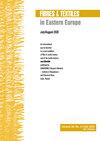Investigation of the Effect of Needle Diameter and the Solution Flow Rate on Fiber Morphology in the Electrospinning Method
IF 0.9
4区 工程技术
Q3 MATERIALS SCIENCE, TEXTILES
引用次数: 0
Abstract
Abstract In the study, the morphological properties of polyacrylonitrile (PAN) fibers produced by electrospinning at different needle diameters and solution flow rates were investigated. For this purpose, 20G and 22G diameter needles were used. The fibres were produced at flow rates of 0.5 ml/hr, 1 ml/hr and 1.5 ml/hr. Scanning electron microscopy (SEM) was used to measure nanofiber diameters. Statistical analyzes were made with the help of the SPSS program. It was observed that finer fibers were obtained as the needle diameter decreased. As the solution flow rate increased, thicker fibers were obtained. In addition, it was observed that the needle diameter and flow rate affect the fiber arrangement and interfiber spacing.静电纺丝法中针径和溶液流速对纤维形态影响的研究
摘要研究了静电纺丝法制备的聚丙烯腈(PAN)纤维在不同针径和溶液流速下的形态特性。为此,使用了直径为20G和22G的针。纤维在0.5 ml/小时、1 ml/小时和1.5 ml/小时的流速下产生。采用扫描电子显微镜(SEM)对纳米纤维直径进行了测量。利用SPSS软件进行统计分析。观察到针尖直径越小,纤维越细。溶液流速越大,纤维越粗。此外,还观察到针径和流速对纤维排列和纤维间距的影响。
本文章由计算机程序翻译,如有差异,请以英文原文为准。
求助全文
约1分钟内获得全文
求助全文
来源期刊

Fibres & Textiles in Eastern Europe
工程技术-材料科学:纺织
CiteScore
1.60
自引率
11.10%
发文量
12
审稿时长
13.5 months
期刊介绍:
FIBRES & TEXTILES in Eastern Europe is a peer reviewed bimonthly scientific journal devoted to current problems of fibre, textile and fibrous products’ science as well as general economic problems of textile industry worldwide. The content of the journal is available online as free open access.
FIBRES & TEXTILES in Eastern Europe constitutes a forum for the exchange of information and the establishment of mutual contact for cooperation between scientific centres, as well as between science and industry.
 求助内容:
求助内容: 应助结果提醒方式:
应助结果提醒方式:


